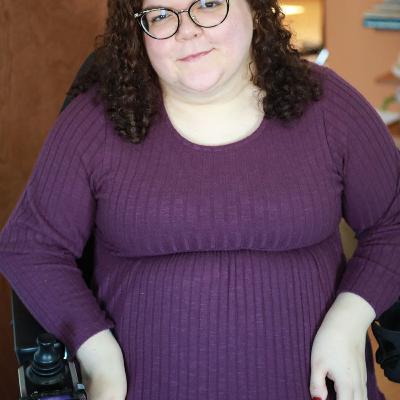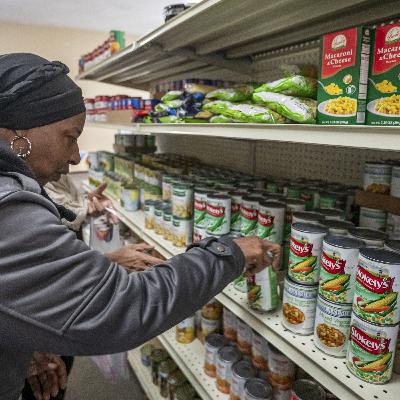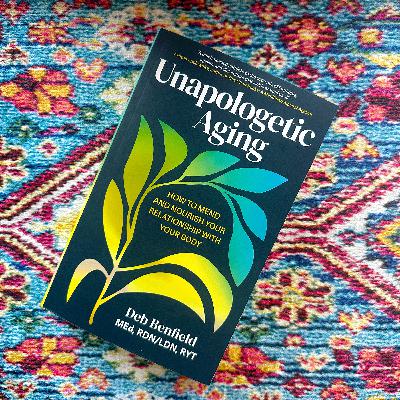"I Don't See Myself in Fat Liberation Spaces."
Description
You’re listening to Burnt Toast! Today, my guest is Emily Ladau, a disability rights activist, and author of Demystifying Disability.
Our conversation today is about the many intersections between anti-fatness and ableism. This is such an important conversation, even if you feel like you’re new to both of these worlds. We investigate who is considered a “worthy” disabled person or a Good Fatty — and how these stereotypes so often pit two marginalization experiences against each other.
Today’s episode is free but if you value this conversation, please consider supporting our work with a paid subscription. Burnt Toast is 100% reader- and listener-supported. We literally can’t do this without you!
PS. You can take 10 percent off Demystifying Disability, or any book we talk about on the podcast, if you order it from the Burnt Toast Bookshop, along with a copy of Fat Talk! (This also applies if you’ve previously bought Fat Talk from them. Just use the code FATTALK at checkout.)
Episode 213 Transcript
Emily
I am a disability rights activist. I am a wheelchair user. I’m the author of a book called Demystifying Disability: What to Know, What to Say, and How to Be an Ally. It’s a bit of a mouthful, but all of that is really just to say that I am very passionate about educating people about the disability experience, and doing it through a lens that recognizes that we’re all at a different point on the journey of thinking about disability and talking about disability. I really want to welcome people into what I know can be a sometimes overwhelming and uncomfortable conversation.
Virginia
You have been a disability rights activist since you appeared on Sesame Street as a 10 year old. I saw the clip. It’s just adorable, little baby Emily. I mean, first tell us about that if you want! Or if you’re sick of talking about it, I get it. But I would also love to know: When did your disability rights work morph into fat liberation work? And how do you see these two spheres intersecting?
Emily
On the Sesame Street note, my family likes to joke that I am totally milking that, because it happened when I was 10. But that was the first moment that I really understood that disabled people do have a place in the media. Prior to that, I had not seen almost anyone who looked like me, with the exception of two books that I read over and over again. And one other little girl who was also on Sesame Street who used a wheelchair.
Virginia
Wow.
Emily
And I’m sure maybe somewhere else out there, there were other things. But I was an early 90s kid, and the media had just not caught up to showing me that I belonged. So having that experience is something that I really don’t take for granted.
I like to joke that in many ways, I am the “typical” disabled person. If you look up a stock photo of someone with a disability, it’s probably a white woman using a wheelchair. Oddly enough, she’s probably also on a beach, holding her arms out. You know?
Virginia
As soon as you said it, I have a visual. I’ve seen that picture. Obviously, she’s on a beach.
Emily
Yes, so I am sort of the cliche version. But at the same time, I’m not. Because there’s sort of an “acceptable” disabled person, and she is the thin, pretty, white woman who is sitting in a wheelchair. I meet, I suppose, some of those traits, but I am someone who, in later years so far, has come to identify as fat and no longer sees that as the derogatory term that it was always leveraged towards me as.
Any relationship that I have to fat liberation work has been sort of an evolutionary process for me. It’s newer to me. I didn’t understand when I was younger how that fit into disability rights work.
But I see now that we can’t have those conversations separately. First of all, every issue is a disability issue. So every issue impacts disabled people. And second of all, the disability community encompasses every identity, every body type, every experience. There are more than a billion disabled people around the world. So you absolutely have every single possible body type within the disability community. And if we are not talking about fat liberation, if we are not talking about LGBTQIA+ rights, if we are not talking about ensuring that our work is meaningfully intersectional, then it’s not actually disability rights work.
Virginia
But it is tricky to figure out how all those things intersect and fit together for sure.
Emily
I feel like I’m constantly playing a game of Tetris with that. And I don’t mean that to say, oh, woe is me. But more so, how do we get society to recognize how those pieces interlock with one another?
Virginia
Do you mind sharing a little bit about how anti-fatness shows up in your own experiences? Sometimes it’s helpful to name those moments, because some people listening might think, oh, I’ve had that too, and I didn’t know to name it as anti-fatness, or, oh, I’ve been on the wrong side of that. And it’s helpful to hear why that was not helpful.
Emily
There is no clear direction to take this answer, because it’s impacted me in two diametrically opposed ways.
The first is that I have been judged incredibly harshly as being lazy, as being unhealthy, as being someone who maybe doesn’t take care of myself in the way that I should. And the wheelchair is seen as the cause of that.
On the flip side, I have also been treated as though disability is the only cause of anything going on in my body, and therefore I should be given a free pass if I am considered, as doctors would say, “overweight.”
Virginia
It’s like, Oh, it’s okay. You’re in a wheelchair. What can we do? We can’t expect you to go for a run.
Emily
Exactly. So you see what I mean. It’s either one or the other. I’m either bad and lazy or it’s like, oh, poor you. You can’t get up and exercise.
Virginia
Both of those are such judgmental, patronizing ways to talk about you and your body.
Emily
They’re super frustrating. I think that both of those are anti-fatness in their own right. But for me, it sends conflicting messages, because I’m trying to seek medical support for certain issues. And some doctors are like, “Lose weight!” And other doctors are like, “Well, we can’t do anything because you’re in a wheelchair.” And so both of those are very unhelpful responses.
Virginia
Oh man, it really speaks to the lack of intersectional care in medicine, that people don’t know how to hold these two facts together and also give you comprehensive medical care at the same time.
Emily
I wish that we could just have disabled people speaking with medical students as a requirement in every single medical school program. But instead, I feel like we’re either completely relegated to the sidelines of conversations in medical school, or maybe we’re brought up in very clinical and dehumanizing ways, and we don’t stop to think holistically about a person.
It’s interesting, because my mom has often said—and I should note, she has the same disability that I do. So she’s a wheelchair user as well. But she feels very strongly that a lot of other medical issues that I am dealing with now were overlooked when I was younger, because everybody was so hung up on my disability that nobody was offering me the support that I needed for other things that could have, in turn, prevented some of what I’m now navigating.
So it seems like healthcare can’t hold multiple truths at once.
They can’t think about your body and think about everything going on. It’s either you’re fat or you’re disabled.
Virginia
God forbid you have a health condition that is not weight linked and not linked to your disability. That’s going to throw them completely for a loop.
Emily
Yeah, it’s very much a binary. I think that it’s led to a lot of confusion among healthcare providers. Certainly, I know there have been delayed diagnoses on many, many things. I’ve also had it leveraged against me in terms of what I would consider chronic illness, because I would get sick pretty regularly when I was a child, and every time I would throw up, it would be thrown in my face: “Well you’re eating poorly. You’re not taking care of yourself.” And nobody thought to do anything to check what was actually going on. They just thought that I was not taking care of myself. Turns out I had gallstones and needed my gallbladder removed. But when people see the wheelchair, they don’t take me seriously.
Virginia
No, and let’s be clear: <stro



![[PREVIEW] Hot People Problems [PREVIEW] Hot People Problems](https://s3.castbox.fm/10/0c/c3/2c4186bb3ffaa958c5a4ee4d3888ceb6df_scaled_v1_400.jpg)
![[PREVIEW] Are Standing Pants Different from Sitting Pants? [PREVIEW] Are Standing Pants Different from Sitting Pants?](https://s3.castbox.fm/be/2c/0c/f737b964d5f27610acbbd373a16c29a78e_scaled_v1_400.jpg)

![[PREVIEW] How Much Did You Pay Your Pumpkin Stylist? [PREVIEW] How Much Did You Pay Your Pumpkin Stylist?](https://s3.castbox.fm/fe/3d/c0/dd8784a5450c5e085b6336501f2ac0f261_scaled_v1_400.jpg)

![[PREVIEW] Can A Body Acceptance Advocate Work for Weight Watchers? [PREVIEW] Can A Body Acceptance Advocate Work for Weight Watchers?](https://s3.castbox.fm/ce/6e/f2/62fdccc162b0b6bc777b5875f2c6d64cfa_scaled_v1_400.jpg)


![[PREVIEW] Not Trying to Be Hot 25-Year-Olds [PREVIEW] Not Trying to Be Hot 25-Year-Olds](https://s3.castbox.fm/1c/8e/70/adb41c046a3fe07dc045af139e24fdcf89_scaled_v1_400.jpg)


![[PREVIEW] Is Back To School A Diet? [PREVIEW] Is Back To School A Diet?](https://c10.patreonusercontent.com/4/patreon-media/p/post/140044897/96658452d0a94d9d9f68587dd8f080e2/eyJkIjo3MiwiaCI6MzAwMCwic3RyaXBfYWxwaGEiOjEsInciOjMwMDAsIndlYnAiOjB9/1.jpg?token-hash=4NQew1ZGkoFCcE9HIPmX96uzAsDTOLrC-hMcXzDZbeQ%3D)


![[PREVIEW] The Mel Robbins Cult of High Fives [PREVIEW] The Mel Robbins Cult of High Fives](https://c10.patreonusercontent.com/4/patreon-media/p/post/140044903/63d8db77f7bf4ae6adc056b196ba3c37/eyJkIjo3MiwiaCI6MzAwMCwic3RyaXBfYWxwaGEiOjEsInciOjMwMDAsIndlYnAiOjB9/1.jpg?token-hash=_lgawLhrnuO4p0kAmMk8Wmg8kk1uHDzmHglZCAmOM1I%3D)
![[PREVIEW] When Parenting Influencers Slide to the Right [PREVIEW] When Parenting Influencers Slide to the Right](https://s3.castbox.fm/1a/37/0c/e4a5f3b307c64e00ce970d9cb6eb9d171d_scaled_v1_400.jpg)

![[PREVIEW] Those Pants Don't Deserve You [PREVIEW] Those Pants Don't Deserve You](https://s3.castbox.fm/e8/55/73/160aa97d85aa018717bd9a8867a20a8572_scaled_v1_400.jpg)



